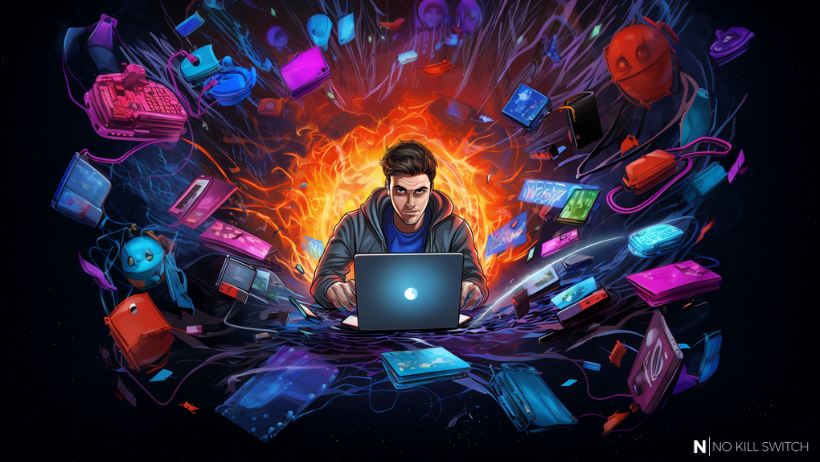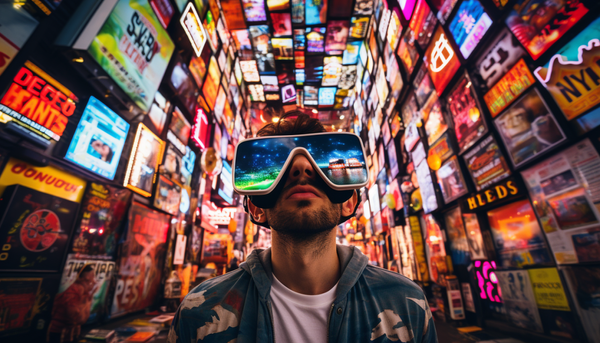I believe that the economic model behind the Internet (in its current collective form) is broken. It has evolved from a proto-model where the information was free, so commercialization was inevitable. However, instead of a frictionless compensation model where the end-users pay a fair monetary price for the service/information, we have to sacrifice our time & focus because of being bombarded with useless advertisements and distracted with flashy headers that scream for our attention (& clicks).
That's what I call broken.
But is that the only way? Or just the most convenient one? Is it even possible to replace all those ad-powered sites and other "free" services with reasonable equivalents that do not feed on our privacy? And just to be clear - ad-blockers are not the answer, IMHO. The faulty business model is still there; you're just cheating that around, harming the service provider that relies on a profit from an ad that is not displayed.
So some time ago (more than two years, time flies ...), I decided to run a little experiment - get rid of applications/services with ads & "camouflaged" ads (automated personalization aimed to sell me something or close me in an info bubble). And find decent replacements devoid of these defects, of course.
How did it go? What has changed? That's what I'd like to cover in this blog post.
But first of all, some disclaimers:
- I don't claim I've fully succeeded - it's nearly impossible & I had to make some sacrifices to maintain a reasonable QoL level. So, yes, you may find some "omissions" or inconsistencies - sorry for the disappointment.
- There are some serious risks & clear disadvantages associated with that change - I'll address them later.
- I'll mention here plenty of tools - I am not affiliated with any of their creators/owners, and I get no benefit from mentioning them here. This is not a paid referral post or anything like that.
Before I even started for good ...
My first obstacle was ... unconsciously following the old habits (e.g., navigating mindlessly to page XYZ at the start of the day). That was annoying, but I've beat that relatively easily with the help of Freedom - a cross-device app that one can use to block access to certain apps/websites. It works like a charm.
When I tackled this minor nuisance, the first real challenge appeared - cutting off all the major privacy brokers: Google, Facebook & alikes. That was not easy for a bunch of reasons:
- using Android phone means Google has got a tight grip on you
- using BigTech identity provider services (which is so convenient, I admit) means that they do know a lot about what you visit & use
Some harsh decisions had to be made:
- I've replaced my Android phone with iPhone (not perfect, but better)
- I've replaced BigTech IdPs with generated passwords in a Password Manager.
- I've stopped using Facebook & other social media except for Twitter & LinkedIn (more on that later).
So far, so good. But it was just the beginning.
Eventually, while browsing, you end up on individual sites - that can also abuse your privacy (e.g., due to 3rd party cookie tracking). That's why I've replaced Chrome with Firefox, and for the majority of sessions where I don't need to be logged in (just browsing the Internet), I use Firefox Focus - which wipes the cookies after each session. I have also installed add-ons like Constent-o-Matic (which automatically rejects everything in CMP pop-ups) & removed all approvals for notifications, location access, content personalization, etc.
Journalism
If I had to call out what has been most dramatically affected by so-called attention economics, my number one would be journalism. A zillion of words have been written on that already, so I'll skip all the grumbling & scolding to focus on what changes I've applied instead:
I have a simple mental model for journalism as I distinguish just two branches: news & "true" journalism (analysis, commentary, investigations, reports, etc.).
News
Regarding the former (news), I've stopped using traditional news (TV news, daily newspapers, news portals) & started relying on personally chosen news sources in my Twitter feed. Important details: it's not Twitter's recommendations ("For you"), but exclusively the sources I follow ("Following") & trust. Frankly, it used to work surprisingly well - in all good times when no one at Twitter was bothered by such meaningless details like revenue or reaching the break-even point ;)
But these times are over. Uncontained Elon adds more & more limitations, so using Twitter is nothing as it used to be. Every four tweets, there's a crappy ad (usually a scam). Scripting/automation is harder & harder to create. Recently they've added rate limiting ... I would not mind paying a fair price to eliminate those annoying constraints, but the current deal (paying for a verified account does not remove all the ads, it just decreases their number by an undeclared number) is a no-go.
So, when it comes to news, I'm currently considering my options. What I used so far was nice, but these days are almost over — time to move on (I bet my hopes on BlueSky, keep fingers crossed).
"True" journalism
The latter ("true" journalism) is also a challenge. I've abandoned all hope that I'll find good, independent, sane-thinking journalists here in Poland (where apparently journalism is fully taken over by radical activists from both the far left & far right side), so I've completely switched to foreign sources instead. Here are the ones I've picked (& decided to pay for):
- Tortoise Media - web, app, podcasts
- Quillette - web, newsletter, podcasts
- Curio - app
The first two rely on their own content. I find them objective, dedicated to facts, and rational in judgments. The last one is a paid service that provides you with a curated selection of articles from the most popular media on the planet (like The Economist, WaPo, WSJ, Wired, FT, ...) - yes, you need to add strong filtering on the top, but having access to all of those (& the freedom of choice) is good if you want to confront points of view or challenge the borders of your virtual bubble.
Search
Not all information comes from the news. Tools like Internet search engines also shape our perception of the world. For years, I was hopelessly addicted to Google search - its advantages regarding the quality of results were so obvious that not using it sounded like self-harm.
Nevertheless, conscious of privacy issues, I decided to give DuckDuckGo a try. The (negative, sadly) difference was perceivable, but I persevered, only to discover that the distance (between Google & DDG) has gotten so small (in time) it's barely noticeable anymore. It's not that DDG has got so much better - it was Google whose quality has nose-dived in a relatively short time. Its search results became less relevant and barely distinguishable from random ads. Then came the next shocker: there are better Internet search engines than Google available already - one just has to pay a fair price for them. The one I've decided to go for is named Kagi.
2023 has brought even more change in this space - the rise of LLMs has shaken the supremacy of search engines. A broad category of problems can now be solved by either a search query or LLM prompt, making you wonder: do I need a search service anymore? In my case - I believe I do (e.g., when I precisely know what I'm looking for or when I'm there just for raw data, etc.).
In the following episode(s) in the series, you'll be able to find out: what else do I find worth paying for, which services I could not give up, do I trust Gen AI-powered services (& which ones) - and at last but not least: how does the life w/o adds & trackers look alike? Was it actually worth it?
The next post in the series can be found here.





